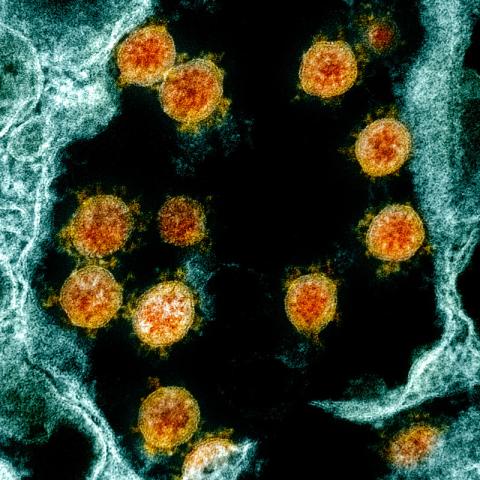
A vaccine targeting the earliest stages of the viral cycle could protect us from all coronaviruses and their variants, including the common cold, according to a study published by researchers at UCL.
The findings, published today in Nature, describe how a vaccine that could induce an immune response to ‘replication proteins’ (which are key to the very earliest stages of the viral cycle) would potentially eliminate SARS-CoV-2 much earlier in its cycle, thereby helping to stop the spread of the virus.
The research team said their discovery could lead to the creation of a ‘pan-coronavirus’ vaccine, that not only protects against SARS-CoV-2 and its variants, but also against coronaviruses that cause common colds, and to new emerging animal coronaviruses.
The mechanism described by the researchers relies on immune memory cells, known as T-cells, being triggered to attack infected cells expressing parts of what the researchers describe as the virus’s ‘internal machinery’. In contrast, the Covid-19 vaccines currently licensed in the UK work by triggering an immune response to the spike protein on the outside of the virus.
Professor Mala Maini (UCL Infection & Immunity) said:
Our research shows that individuals who naturally resisted detectable SARS-CoV-2 infection generated memory T cells that target infected cells expressing the replication proteins, part of the virus’s internal machinery.
These proteins – required for the earliest stage of the virus’s life cycle, as soon as it enters a cell - are common to all coronaviruses and remain ‘highly conserved’, so are unlikely to change or mutate.
A vaccine that can induce T cells to recognise and target infected cells expressing these proteins, essential to the virus’s success, would be more effective at eliminating early SARS-CoV-2, and may have the added benefit that they also recognise other coronaviruses that currently infect humans or that could in the future.
The research team described how next-generation vaccines could be developed to combine this new mechanism with that of existing vaccines, therefore targeting both replication proteins and spike proteins.
Professor Maini added:
This dual-action vaccine would provide more flexibility against mutations, and because T cells can be incredibly long-lived, could also provide longer-lasting immunity.
The discovery was the result of an observational study led by UCL and St Bartholomew’s Hospital, which analysed immune responses in a large cohort of UK healthcare workers from the beginning of the first wave of the pandemic.
The researchers noticed that there was a group of people who were seemingly resistant to infection, and this group was found to have raised levels of T-cells. This T-cell response was an indication that these people had actually undergone a fleeting, low-level infection (described by the researchers as an ‘abortive’ infection) which wasn’t detectable by routine tests, but which nevertheless generated T-cells to fight the virus. This theory was supported by people in this group testing positive for a blood marker of viral infection.
Dr Leo Swadling (UCL Infection & Immunity), who co-authored the paper, said:
We know that some individuals remain uninfected despite having likely exposure to the virus. What we didn’t know is whether these individuals really did manage to completely avoid the virus or whether they naturally cleared the virus before it was detectable by routine tests.
By intensively monitoring health care workers for signs of infection and immune responses, we identified a minority with this particular SARS-CoV-2 specific T cell response.
What is really informative is that the T cells detected in these individuals, where the virus failed to establish a successful infection, preferentially target different regions of the virus to those seen after infection.
The regions of the virus that these T cells recognise are highly conserved amongst other members of the coronavirus family, such as those that cause common colds every year. Previous common cold exposure may have given these individuals a head start against the virus, tipping the balance in favour of their immune system eliminating the virus before it could start to replicate.
This research was funded by the National Institute for Health Research and UK Research and Innovation’s UK Coronavirus Immunology Consortium.
